Wilson Building Bulletin: A cold dose of reality on D.C.’s budget
And Trayon White gets a new trial date.
But Gael Gomez wants people to keep looking up — at the sky and in life.

On a chilly October night, dozens of people gathered at Lost Origins Gallery in Mount Pleasant. The walls were covered in big, striking photo prints: one showed the phases of the moon above D.C. rowhouses, another a pinkish-purple nebula splattered with countless stars; one captured a startrail across a magenta sky.
On the back porch, telescopes were set up despite the overcast, drizzly weather. When the clouds parted and the moon peeked out, people chanted: “Moon! Moon! Moon!” They rushed to the telescopes, waiting in line to see its craters up close.
Community members had come to Lost Origins Gallery for two reasons: to see the debut exhibit of the Mount Pleasant Sidewalk Astronomers, and to say goodbye to a co-founder of the project, 19-year-old Gael Gomez.
Gomez, who has lived in D.C. with his family since he was 12, was one of the hundreds of thousands of Venezuelans in the U.S. whose Temporary Protected Status (TPS) was revoked after the Supreme Court allowed the Trump administration to end the legal protection shielding them from detention and deportation. As a result, Gomez and his family are all but certain to leave the country soon, upending the lives they’ve built in the District.
That night, Gomez had a lot of attention on him, and any person in his shoes would be understandably overwhelmed. Yet, in spite of the spotlight and his uncertain future, Gomez did what he’s been known to do: enthusiastically talk to people about telescopes, space, and astrophotography.
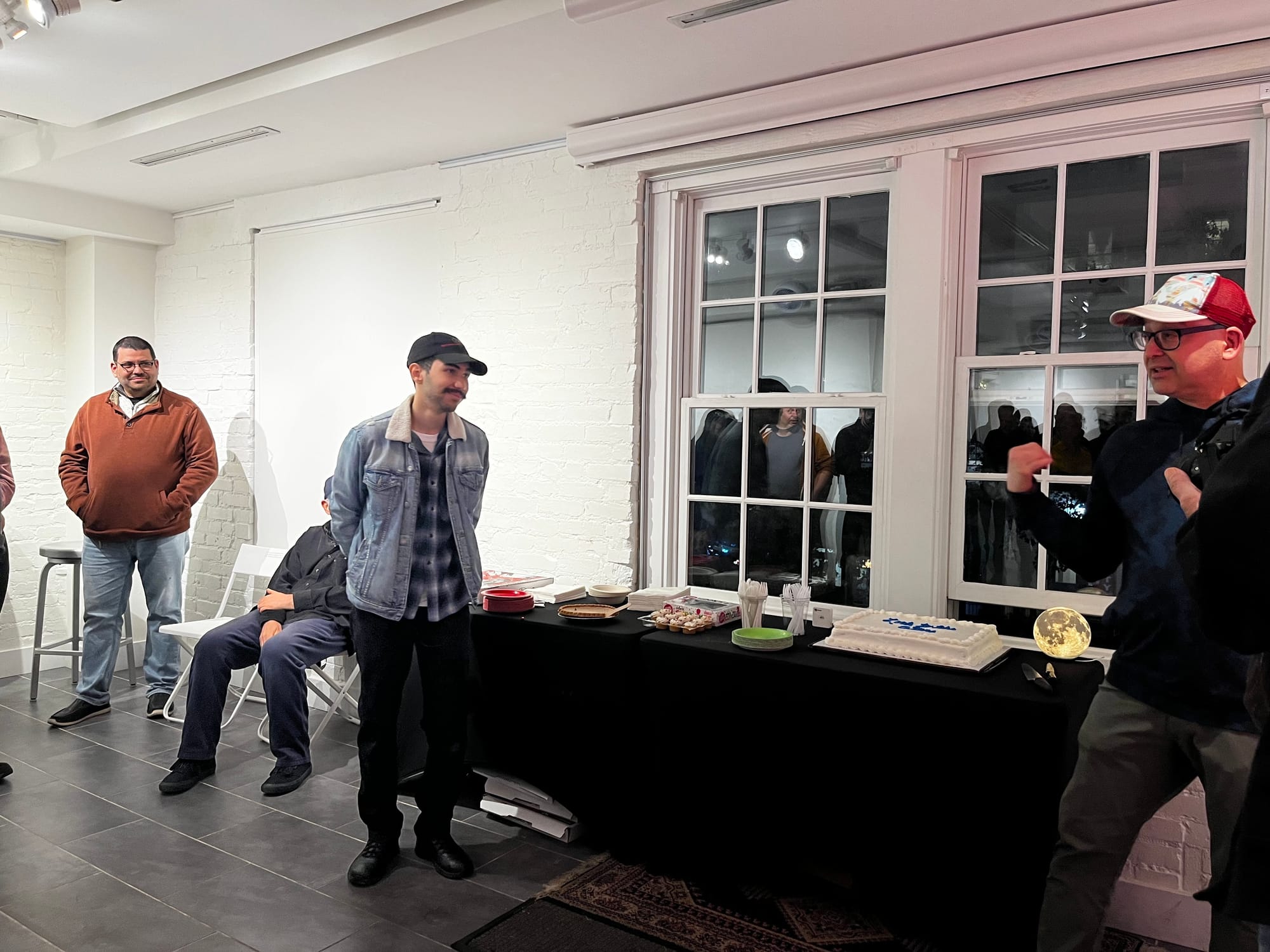
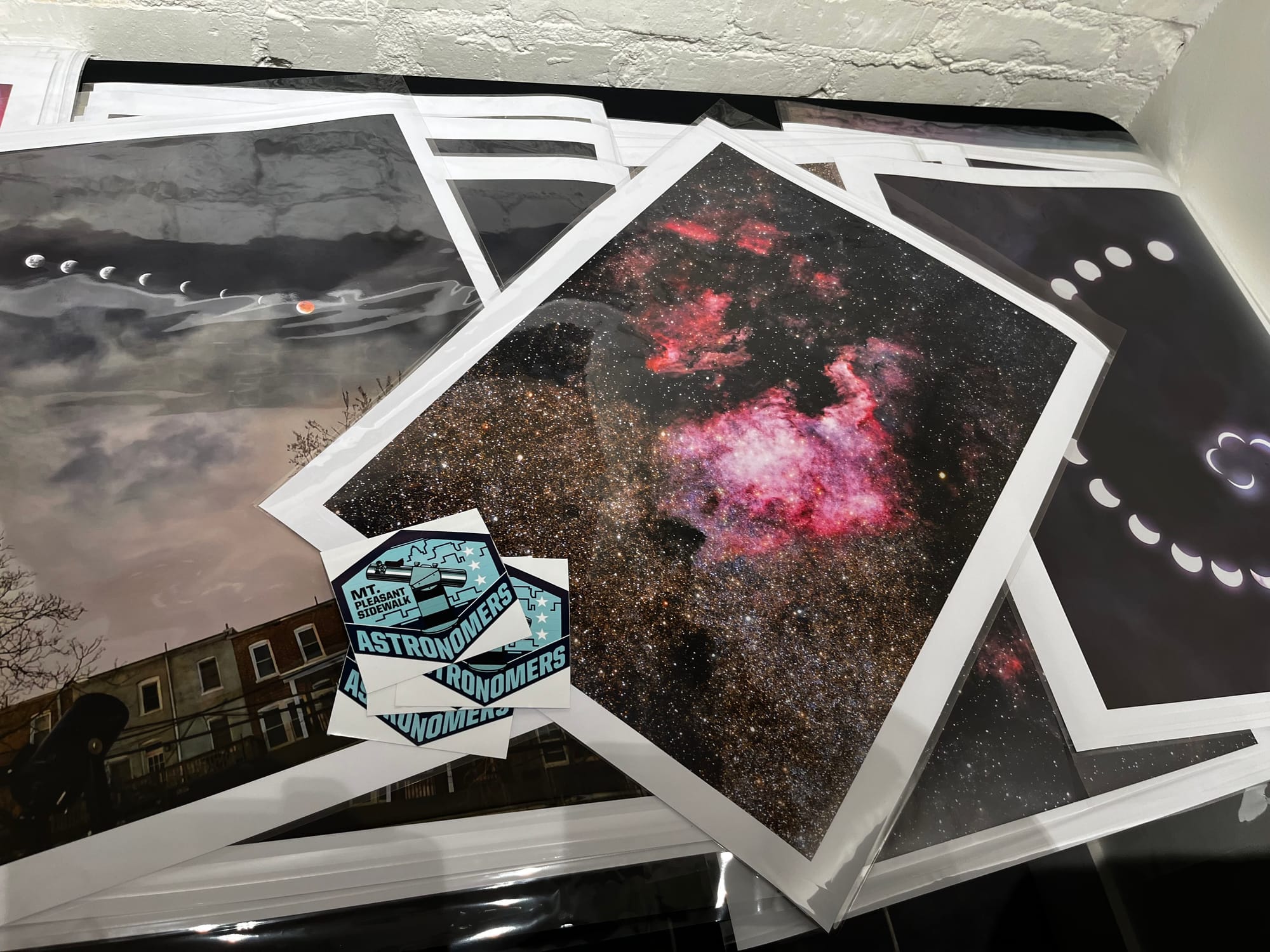
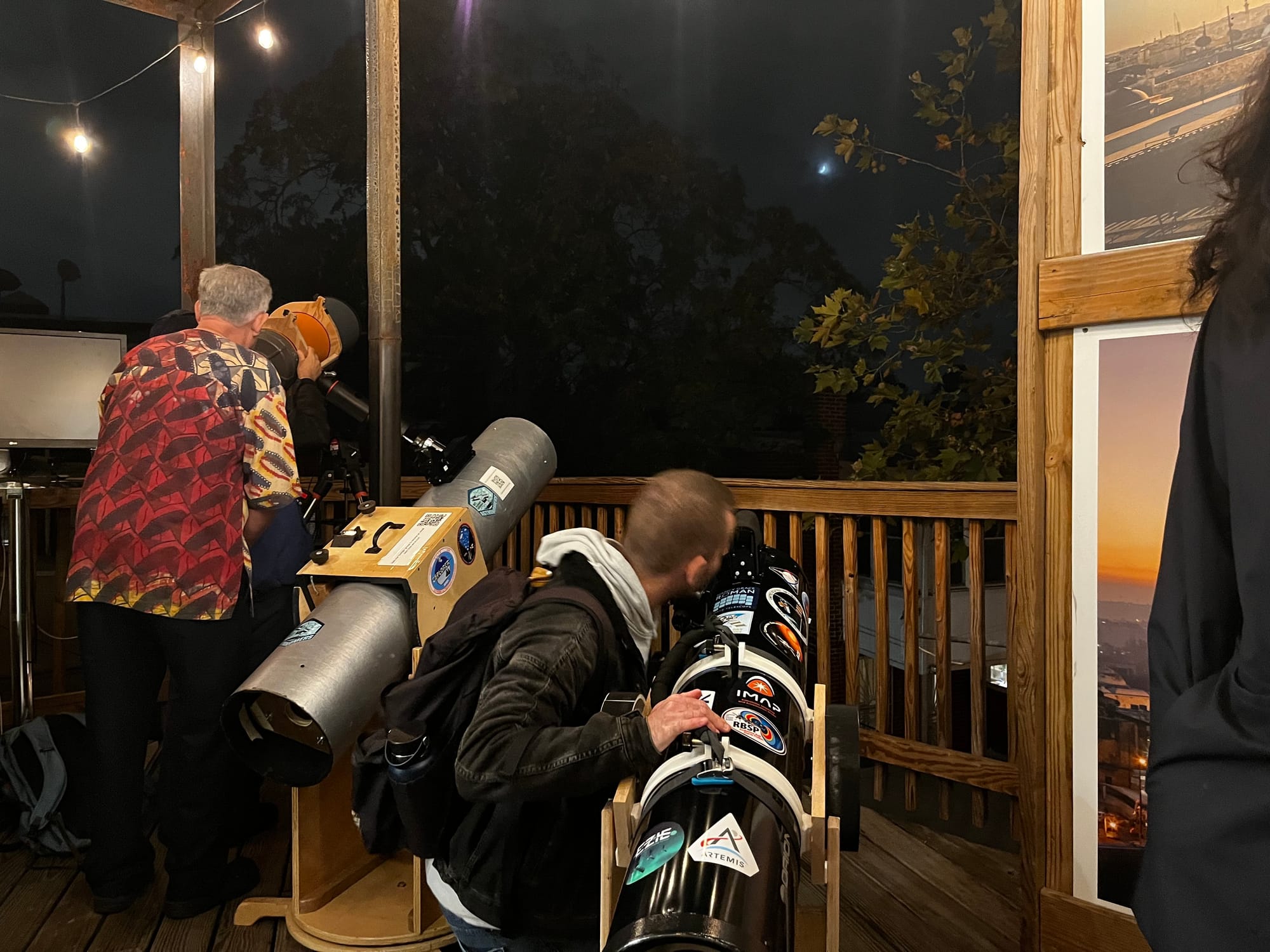
Lost Origins Gallery hosted Gael's going away party. (Maddie Poore)
Gomez’s love for space goes back to when he was 9 years old in Venezuela and his father found a telescope in a dumpster. Gomez fixed it up and pointed it at the moon. “That was when I first fell in love with the sky, and telescopes in particular,” he said.
His passion for sharing telescopes with others wasn’t fully realized until years later, after Gomez and his family moved to D.C. When he was 16, he came across a flyer for a telescope workshop hosted by the National Capital Astronomers. After attending, Gomez spent the next year designing and crafting his very first telescope.
But Gomez’s home didn’t have a great observing place, and he says that being young and alone with a large piece of equipment on the streets at night didn’t always feel safe.
So when Gomez saw his next door neighbor Adam Green wearing a NASA t-shirt, he stopped to ask him a simple question: Did he like space? After finding out that they were both amateur astronomers who own telescopes, Gomez followed up with another question: Would Green like to go out on the corner with a telescope and look at the stars together?
“And then we went out to the corner, and I had a blast,” said Green, a self-described “curmudgeon” who has lived in the neighborhood for 30 years. They set up on the corner of Mount Pleasant and Irving Streets, marking the beginning of the Mount Pleasant Sidewalk Astronomers (and a deep friendship).
With Green by his side, Gomez soon realized that this could turn into something where he could share his passion with other people. “I want to share that first moment of looking at the moon with wonder and going, ‘Wow!’” said Gomez, before emulating a dramatic gasp. “I wanted to share that, and to see it in other people.”
So it was as if the stars aligned when weeks into the ritual of bringing their telescopes onto the sidewalk, the activity between two neighbors turned into a weekly community gathering. On any given night, hundreds of people could stop by. “One time when I was there, somebody literally jumped out of their car while at the stoplight, because he was so excited to look through the telescope,” recalled Rachel Goldstein, a Mount Pleasant resident who attended the Lost Origins Gallery party. Other attendees fondly described their experiences with sidewalk astronomy, like being amazed at seeing Saturn’s rings and its moon Titan through a telescope for the first time.
Sidewalk astronomy has changed Gomez. Before this project started a year and a half ago, he described himself as “a very quiet guy.” Now, he says he’s someone who “would not shut up about things he likes.” He’s a person who is brave enough to chat up strangers at night, and encourage them to see the wonders of our world. It’s no surprise that his dream job is to be an educator — like a guide at an observatory or a space museum, where he can talk with others. “He's out there just saying: ‘Hey, you want to see the moon? Have you ever seen Jupiter? Have you ever seen this? Have you ever seen that?’” said Ash, a Mount Pleasant resident who requested to go by their first name for privacy concerns. “I feel like it jolts people out of their routine in a really wonderful way.”
But there’s also been a deeper, fundamental growth that comes with spearheading this work. Seeing stars that are lightyears away with his own eyes, from a sidewalk on the only planet with known life, has grounded Gomez and shifted some of the personal beliefs he grew up with. “It changes your whole perspective of the universe, and just of yourself,” he says.
“It's a view outwards into the universe,” he adds, “just as it is the view inwards into yourself.”
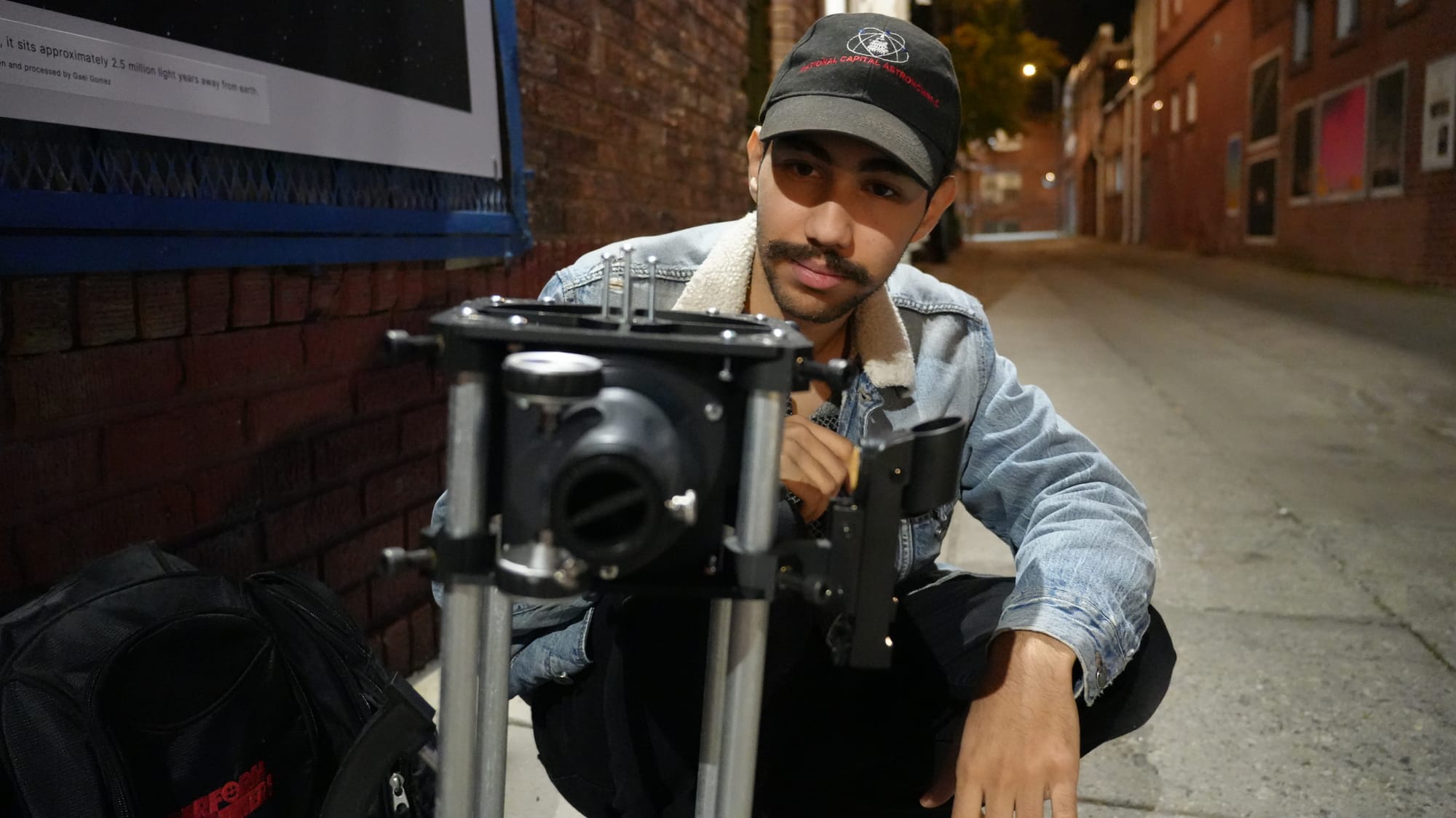
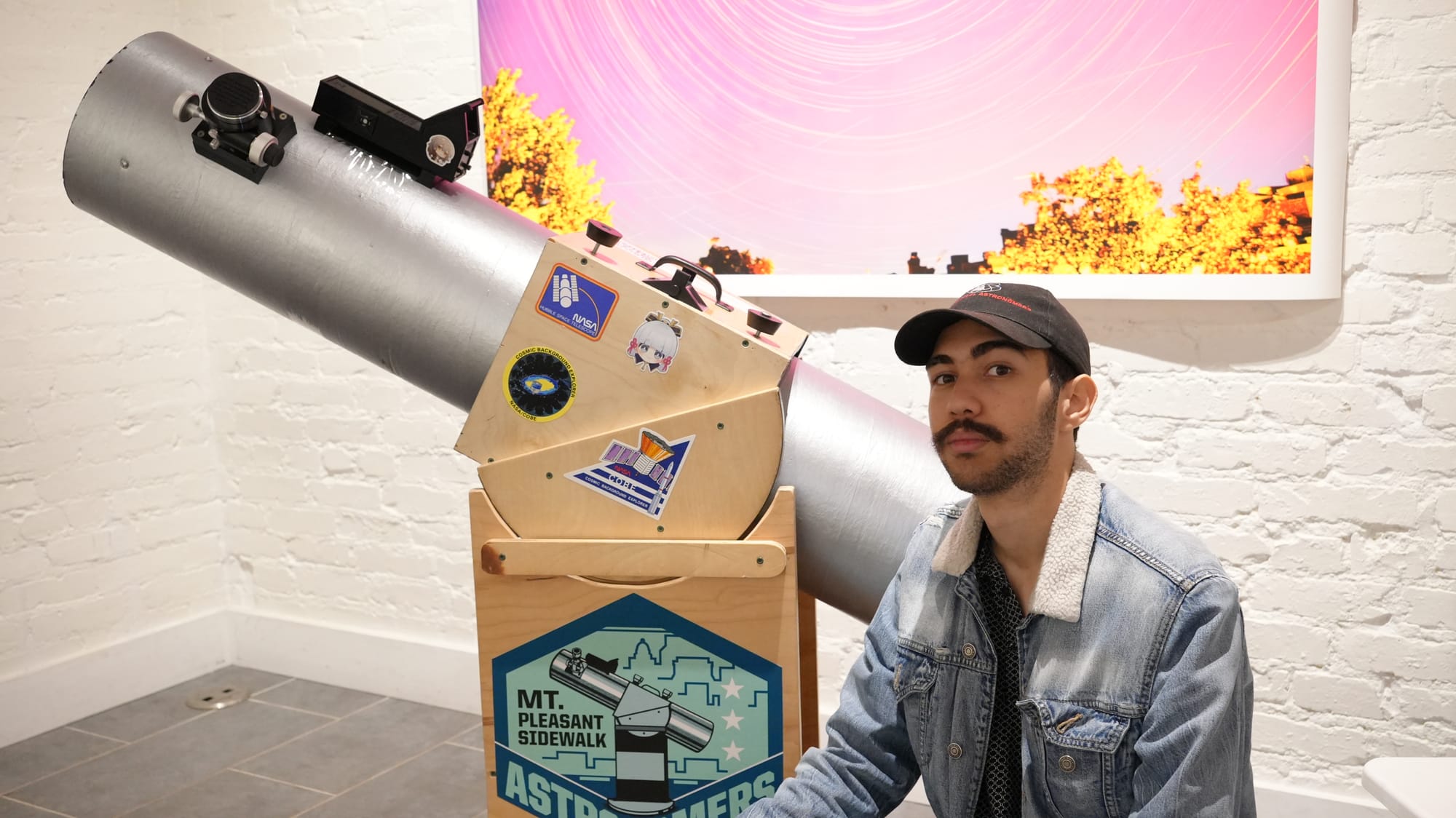
On the left is Gomez's Newtonian telescope, the only one he'll be able to bring with him when he leaves D.C. On the right is one of his larger telescopes, pictured in Lost Origins Gallery. (Sam Delgado)
For Mount Pleasant, a tight-knit neighborhood where immigrants are deeply embedded into the social fabric, the Trump administration’s targeting of migrants has shaken the community. “Mount Pleasant is my home,” Gomez told The 51st. “It's where I feel safe.”
Amy Fischer, Director of Refugee and Migrant Rights at Amnesty International and organizer with Migrant Solidarity Mutual Aid, says that since the start of Trump administration, “there has been a very much a concerted effort to make people lose their status and become deportable and remove as many people from our communities as possible.”
After the federal takeover in August, D.C. residents have become ICE watchdogs, warning their neighbors about sightings in online channels like NextDoor and Reddit. But these efforts can only go so far, and residents have had to watch their neighbors be taken away by ICE and retreat from public life.
The current number of ICE detentions in D.C. is unclear, as the Trump administration has stopped publicly sharing this data. In early October, a CBS analysis found the number was almost 1,400.
“It's devastating, especially when you see all the joy, all the great things that they actually do for themselves, their family, and their community,” said Dee Correa, an attendee of the Lost Origins Gallery exhibit, about the city’s immigrant communities.
Gomez’s departure hits close to home for other immigrants in D.C., like Correa’s wife María J. Huerta, a green card holder who went to her first sidewalk astronomy event last week. “It's so unjust, and the community is literally losing a pillar,” she said. “But [sidewalk astronomy] will never be taken away,” Maria added. “It's part of the community now.”
At the party, Green stressed that sidewalk astronomy in Mount Pleasant is not over. At the same time, he knows Gomez leaving is a loss for the community and for the project. “I've seen a lot of people come up out of Mount Pleasant and do amazing things,” said Green. “And I think he's one of the more special people.”
Days before his final sidewalk astronomy event on Halloween, Gomez stayed up all night finishing something special. Kneeling in the alley of the exhibit showcasing sidewalk astronomy’s astrophotography, he pulled metal tubes and an assortment of parts in various shapes and sizes from his backpack. In minutes, he assembles a telescope, just over two feet tall. At its base, there’s a Mount Pleasant Sidewalk Astronomers sticker.
It’s a 5-inch Newtonian telescope, Gomez said. And it’s the only one he’ll be able to bring with him when he leaves D.C. for Venezuela.
As he unassembled the telescope, two people walked past and stopped to look at the exhibit, before recognizing Gomez as one of the sidewalk astronomy leaders. They chatted, and in classic Gomez fashion, he told them about the Halloween event and helped one of them subscribe to the sidewalk astronomy newsletter.
Despite navigating a difficult situation for him and his family, Gomez often speaks with a profound sense of optimism. He believes there are more good people in the world than there are bad. He wants others to feel hopeful from community projects like sidewalk astronomy, just as it has given him hope. And when he leaves, he doesn’t want his absence to mark the end of Mount Pleasant Sidewalk Astronomers. In fact, Gomez says he wants it to be the beginning.
“I want Mount Pleasant to be known as the neighborhood of beautiful restaurants, and beautiful streets, and beautiful people,” says Gomez. “I want it to be known as the window to the universe from Washington, D.C. I want it to be known as the neighborhood of wonder, and the neighborhood of the stars.”
Gracie McKenzie contributed reporting to this story.
With your help, we pursue stories that hold leaders to account, demystify opaque city and civic processes, and celebrate the idiosyncrasies that make us proud to call D.C. home. Put simply, our mission is to make it easier — and more fun — to live in the District. Our members help keep local news free and independent for all: